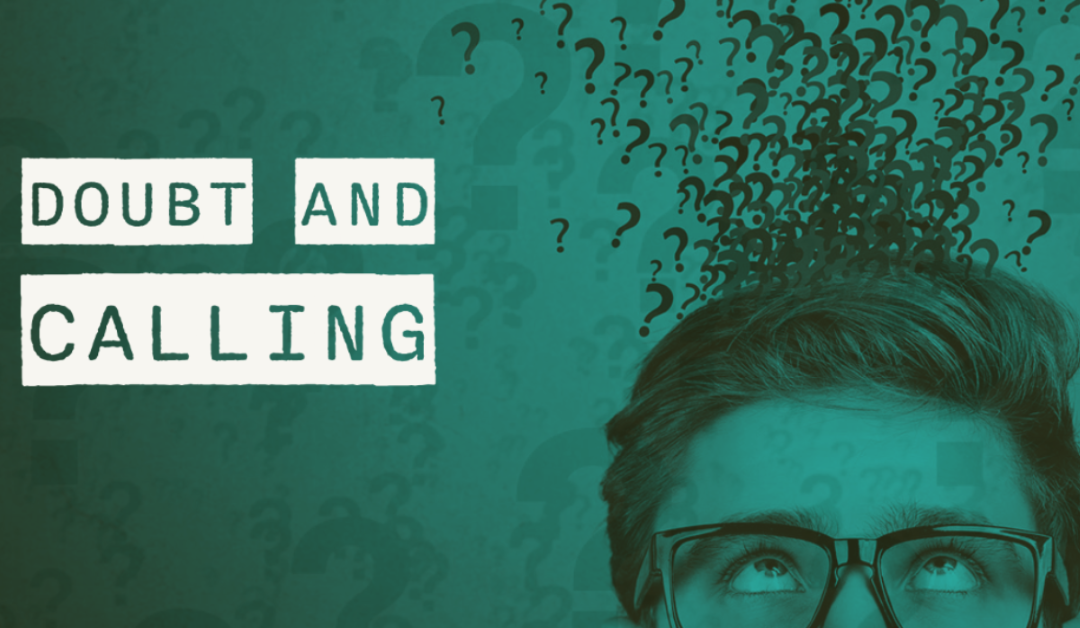The Call of God
I remember when I was still a youth, just after getting accepted into Bible college, and just before the first year of study was to begin, I had serious doubts regarding my entering the ministry.
One night I went out during an altar call, asking for agreement in prayer. I expressed my doubts about formalizing my ministry. At this stage – at eighteen years old – ministry was not a new thing for me. I had started out preaching, running small groups and being a part of the worship team since my early teens. I had spent four years going weekly to the hospital to pray for the sick. Made efforts to attend every Bible study, help with Sunday school, volunteered at youth groups.
Church was something I was born to do. Just like Joshua, as a young man, I had my own Moses. An elderly pastor who mentored me, and spent a lot of time teaching me, guiding me, encouraging me towards this moment. However, now that the call was going to be ‘made official’ my feet started going cold.
A third year student came to pray for me, and after hearing my ‘complaint’ gave me the following sage advice – “If you don’t feel ready now for the call of God, you never will be.”
Over the last 15 years these words have stuck with me.
Every time I went through a rough patch, or some self-doubt – or a dark night of the soul as the mystics called it – I would hear these words and push through.
In Numbers 13:8 we are introduced to another young man who would find himself in a similar situation. He is introduced as Hoshea, son of Nun, from the tribe of Ephraim.
His name is ‘Deliverance” or ‘Salvation” but at some point a little later his name gets changed to Joshua (Yehoshua) which much like the name “Yeshua” or English “Jesus” means “God is Salvation”.
His name gets changed to make clear where the salvation comes from. Not from man or any other power, but from God. God is our deliverer. God is our salvation.
In the first chapter of Joshua, we see God speaking to the warrior-prophet.
“After the death of Moses, the servant of the Lord, it came to pass that the Lord spoke to Joshua the son of Nun, Moses’ assistant, saying: Moses My servant is dead. Now therefore, arise, go over the Jordan, you and all the people, to the land which I am giving to them – the children of Israel.”
Moses, the Servant of the Lord, had passed away, and his assistant Joshua is called by God, directed to fill the shoes of his predecessor. It is interesting to note in verse 1 that Joshua is refered to as ‘the servant of Moses’, and not the “servant of the Lord” at this stage.
The vision God gives him in this moment is earth-shaking. Too big to comprehend.
God given vision, a God given calling, usually is.
And it is almost certain that Joshua quite possibly doubted in his own ability to set out and accomplish this mission, for God encourages him three times in the first nine verses that he (Joshua) will not be going into this alone, God will be with him.
Jeremiah doubted
Doubt is not a rarity in the Bible. Many of the prophets and leaders God called had doubts about themselves.
Jeremiah for example, finds himself one day hearing the voice of God.
“Then the word of the Lord came to me, saying:
Before I formed you in the womb I knew you; before you were born I sanctified you; I ordained you a prophet to the nations.”
Jeremiah is immediately overcome by self-doubt. He cries back to God, “I cannot do this for I am just a youth”. Not a “young man” – but a “child”.
It is important to note that Josiah, son of Amon, and king of Judah at this time became king at the tender age of eight. Scholars seem to agree that Jeremiah, in the thirteenth year of Josiah’s reign would have been somewhere between the age of 13 and 16.
But God, very reminiscent of Paul’s advice to the young minister Timothy, admonishes him to not look at his age, but to rest in the thought that He will empower him in what is to be done.
“Behold, I have put My words in your mouth. See I have this day set you over the nations and oer the kingdoms; to root out and pull down, to destroy and to throw down, to build and to plant.”
Immediately after these words we find a sort of confirmation of the calling and acceptance on the side of Jeremiah as he receives the vision of the almond branch.
Isaiah felt unworthy
Isaiah in chapter 6 of the book of the same name – whose name also interestingly means “God is salvation” – has a vision of the Lord upon His throne. The angels cried out “Holy, holy, holy is the Lord God, the Lord of Hosts. The temple was filled with His presence, the very foundations shaking with his holiness. The house was filled with smoke.
Isaiah sees the glory of God and immediately he is despondent. In verse 5 he calls out “woe is me, for I am undone! Because I am a man of unclean lips, and I dwell in the midst of a people of unclean lips; for my eyes have seen the King, the Lord of Hosts.”
The chapter is described as the ‘calling of Isaiah as a prophet’, although it seems that he had already been receiving visions and prophecies before this time. This chapter seems to be more of a confirmation of the call already on his life.
However, the servant of God is still dismayed at seeing the Lord.
When we as human beings are confronted by the glory of God, there is no way that we cannot react the same.
An encounter with God is necessary before Isaiah is ready to receive and move in the direction of his calling. “Behold, this (a live coal from the altar) has touched your lips, your iniquity is taken away, and your sin is purged.”
A part of me wonders if the live coal – the purging – the burning was at all uncomfortable for Isaiah.
I imagine it would be.
I somewhat wonder if he watched the angel coming towards him, holding the tongs with which the coal had been taken up, with fear, awe and wonder.
I’m sure I would have.
Sometimes the calling is uncomfortable. Sometimes the things we need to go through to discover our purpose is uncomfortable. Perhaps even painful.
Yet, after this encounter we find Isaiah is weighed worthy, feels worthy enough to respond to the call, “Here I am, send me”.
Moses outright argued
Since we are looking at Joshua, we also have to pause and reflect on Moses. His name is mentioned 10 times in Joshua chapter 1 alone.
In Exodus 3 we find a younger Moses tending to his father-in-law, Jethro’s sheep, after having killed an Egyptian and fleeing to Midian.
He led the flock to Mt. Horeb, and here he has a startling, life changing encounter with God.
A bush bursts into flame as the Angel of the Lord appears to him, and Moses gets called near. God explains that he has heard the groaning of His children, that He has taken note of the oppression taking place under the iron fisted rule of the Egyptians, and that Moses will be His instrument in bringing the Israelites out of bondage and into the Promised Land.
Immediately though Moses questions this call.
In Exodus 3:11: he says to God, “but who am I that I should go to Pharaoh, and that I should bring the children of Israel out of Egypt?”
God, who am I that you could trust me with this duty? Who am I?
Isn’t this the most common response? I am not good enough! That’s what Moses is saying. I am unworthy.
I must admit that I have always preferred the preacher who doubts in himself, but trusts in God and grows in boldness over time, than those who arrogantly and ignorantly climb onto the pulpit. The Word of God is holy and should be approached with respect, with awe and reverent fear. His work should be done diligently. It is with great ardour that we study to show ourselves approved, seeking not material gain, fame or social standing, but that souls may be saved through the grace of God.
We see this in the prophets mentioned above – even in Moses. The Law-Giver, the one one who led his people out of Egypt, the same Moses through whom God parted the Red Sea – this great and almost legendary figure so highly regarded by history – his first question to God, his first argument against his calling is: Who am I? I am not good enough.
And perhaps this is where you find yourself right now. You feel the stirring of the Spirit within you. You feel the flames of passion pushing you in a certain direction. You feel the tingling of a God given purpose. You know you are called to make a difference, but somehow you argue that it cannot possibly be, because of qualifications, insecurities, fears and anxieties – but God does not call the qualified – I know it’s a cliche, but bear with me – God qualifies the called.
So God speaks to Moses, and tells him that the calling will be confirmed through signs and wonders – Moses just has to trust in the plans and purposes of God.
Still, Moses is unsure. This continues for quite a while – Moses arguing with God.
“What if they don’t believe me? I can’t just go to them and say ‘the God of your fathers sent me’ – surely they will ask me what Your name is? What shall I say?”
But God keeps answering. “I AM WHO I AM.”
Still Moses keeps arguing, going so far as to say, “I’ve never been very eloquent, people won’t listen to me.” and the final one, out right denying the call of God, the epitome of self-doubt – “God, please send someone else.”
God has called each of us for a purpose, for a reason – and for some it is easier to say, “God, please send someone else.”
However, in the fourth chapter of Exodus, God assures him once more that He will be with Moses, that he will supply the resources necessary – in fact – Moses already has all the resources he needs.
The rest is history.
HIS story.
God wants to use us to tell His story, to write history.
Jesus is calling. You are called to be a minister of the Gospel. We all are. That’s the beauty of the Cross – the Blood calls to the East, to the West, to the South and to North. The blood of Jesus calls us near, to become a part of this family. To become a part of this royal priesthood. To leave our chains, to come out of our graves, to turn our back on the darkness that enveloped us before, and proclaim the goodness of Him who called us.
Moses argues that he is not eloquent enough to lead the people out. God instructs him to use Aaron as his mouthpiece (Exodus 4:16).
Exodus 4:16 – 17: “So he (Aaron) shall be your spokesman to the people. And he himself shall be as a mouth for you, and you shall be to him as God. And you shall take this rod in your hand, with which you shall do the signs.”
“YOU SHALL BE TO HIM AS GOD”.
We are called to be imitators of Christ, to be a reflection of God. We were created in His image, after all, and even though that image might have been tarnished by sin and carnality, it has been restored through the reconciliation found in the Blood of Jesus.
You are called to be as God to those around you. The Kingdom should not just be something you belong to, but a lifestyle. God is not just an object of worship – He is living and active in our lives.
He has called you. And He will provide the opportunities and resources you need to fulfill the words of The Our Father.
“Your Kingdom come, Your will be done on Earth as it is in Heaven.”
May the same Spirit that raised Jesus from the dead, be living and active in you, around you and most importantly through you.






